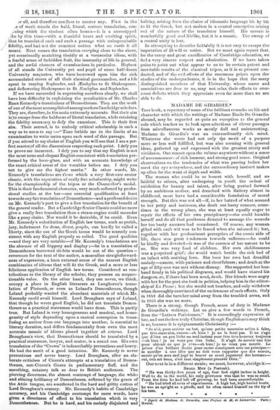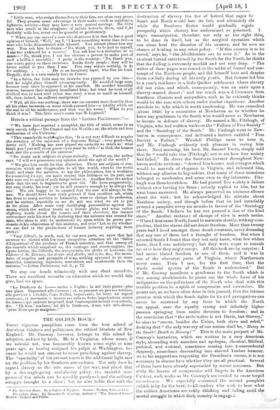MADAME DE GIRARDIN.* Tills book, a repertory of some of
the brilliant remarks on life and character with which the writings of Madame Emile Do Girardin abound, may be regarded as quite an exception to the general rule which teaches us to look upon selections of clever passages from miscellaneous works as mostly dull and uninteresting. Madame de Girardin's was an extraordinarily rich mind.
Whatever she wrote had not only tire merit of a purpose more or less well fulfilled, but was also teeming with general ideas, gathered up and expressed with the greatest nicety and vividness. One cannot open the volume anywhere without a sense of uncomnionness : of rich humour, and strong good sense. Original observations on the tendencies of what was passing before her meet the eye everywhere, and the extraordivary instinct makes up often for the want of depth and width.
The woman who could be so honest with herself, and so faithful to others, after undergoing in youth the ordeal of exhibition for beauty and talent, after being pushed forward by an ambitious mother, and drenched with flattery almost in childhood, must have had a considerable foundation of moral strength. But this was not all—if, in her hatred of what seemed
to her petty and insincere, she dealt out hasty censure, some- times in the wrong place, she was at least equally eager to,
repair the effects of her own precipitancy—she could humble herself and do all that penitence dictated to assuage the wounds: her too hasty sarcasm had occasioned. Of course, any woman gifted with such wit was to be feared when she misused it ; but, together with her predominant perception of the comic side of life, there was great tenderness towards sufferers—she could be kindly and devoted—it was of the essence of her nature to be so. She was very fond of children. Her own childlessness- was a perpetual grief; she would watch beside the sick bed of an infant with untiring love. She bore her own last dreadful malady—cancer, with patience and cheerfulness; and death at the age of fifty-one was met without dismay. She supported her hus- band firmly in his political disgraces, and would have shared his dungeon, or, if there had been need, death. Her friends were angry with her for the part she took in politics, helping him in the editor- ship of Lx Presse; but she would not hearken, and only withdrew when thoroughly convinced of the uselessness of such efforts. Only in 1852 did she turn her mind away from the troubled arena, and in 1855 she was no more.
There is a strong, though French, sense of duty in Madame de Girardin's writings. Let us give a few words in French, from the "Lettres Parisiennes." It is exceedingly expressive of her, and not the less truly Christian, though Englishmen may think is so, because it is epigrammatic Christianity :—
" Je n'ai, pour arriver au but, qu'une petite mauvaise action a faire, pas tres-mauvaise, encore—eh bien ! je ne la ferai pas. Il ne s'agit que d'être un peu lathe un seul instant pour etre tres.heureux toujouns —eh bien ! je ne veux pas etre lathe. Il s'agit de mentir une foie pour obtenir ce quo je reve—eb bien! je ne veux pas mentir. Le priver d'un brillant destin pour rester consequent avec see principes- se sacrifier a une idea que ne doit vous rapporter que des ennuis, savoir qu'on sera mel jugd et braver ce cruel jugement des hommes- oui, eels eat beau, o'est tout simplement prouver Dieu."
Our next is in a different strain; we must, however, abridge it:---
SMALL MEN (a Portrait).
" He was thirty-five years of age, four feet eight inches in height. Well to do in the world, his only grievance was that he was so small- From the time he had left off growing, he had been uncomfortable.
" He had tried all sorts of experiments. A high bat, high-heeled boots, he was as upright as a giraffe, and he often raised himself on the tip of
his toes. • • * • •
Esprit de Madame dz. Girardin, avec Preface de if. de Lamarline. Paris : HetzeL
" Little men, who resign themselves to their fate, are often very grace- ful. They possess some advantage in their make—such as suppleness, lightness, activity—they may have a very genteel carriage. But little men who revolt at the stinginess of nature towards them, and fi;ht foolishly with her, never can be graceful or gentlemanly.
" When any one says of a man who displeases him that he has a good opinion of himself, Well,' say I, ' I knew something worse than thal—a man who looks discontented with himself. You cannot please hint any way. You ask him to dinner—' No, thank you, to be just to myself, I am too awkward for a convive.' You ask him to a recitation or to music—' No, thank yon, I am too obscure a person to make part of such a brilliant assembly.' A party in the country— No, thank you, one wants gaiety on these occasions. Invite lively people ; they will be better suited to you than I am.' This man enjoys nothing, is fit for nothing He is an imaginary leper, who dies his kind. Happily, this is a rare malady here in France.
"In a Salon, the little man we describe was pursued by one idea— how he might place himself advantageously. He avoided large men, because near them he appeared at his smallest. He avoided beautiful women, because their majesty humiliated him ; but what he most of all disliked was to meet with (what was rare) a man as small as himself. Oh, then, indeed, he suffered martyrdom !
" Well, all this was nothing ; there was one torment more horrible than all his other torments—a curse which pursued him—a fatality which set the seal to all his misfortunes, and that was his name ! What do you think it was ? This little man's name was Iii. Legrand."
Here is a critical passage from the " Lettres Parisiennes :"— " We have just received a pamphlet, the title of which seems to us very naively lofty—' Ihe Creator and the Worlds; or, the whole and true mechanism of the Universe.'
"This remarkable worlcsbegins thus, 'It is not very difficult to acquire the certainty of the existence of a Supreme Being,' —very good—but, better still, Nothing has ever piqued my curiosity so much as' what think you ? you will never guess—you must be told—' as God, the human soul, and the ensemble of the universe.'
"No doubt such subjects do pique curiosity. Further on, the author says, I will not'pronounce any opinion about the age of the world !'
" We give him credit for that discretion. There are subjects of con- versation which are disagreeable to all the world, even to the world itself; and since the universe, so say the philosophers, has a weakness for concealing its age, one must respect this littleness on its part, and take care not to speak of such things before it. Another time the author finds that the sun is beginning to grow He loses progressively, but very slowly, his heat ; yet he will preserve enough to be always the sun.' We are happy to be assured that the sun will always be the ann. We should have been truly grieved if that excellent orb, which has done so many services to humanity, were to change its profession, and be extinct, especially as we do not see what we are W put in its place. After some very disobliging personalities against the moon, which the author treats as a barren globe, and some rather slighting words about the comets and their chevelure, the learned astronomer ends his tract by declaring that the universe was created for man, who alone is able to understand it; upon which he grows pas- sionate in his admiration of this universe, and cries Let us try whether ive can find in the productions of human industry anything more perfect.'
"Very difficult, in truth, and, for our own parts, we avow that last trimmer we visited with the most scrupulous attention all the Sallee d'Exposition' of the products of French industry, and that among all the marvels which surprised us, the carriages and steam-engines, the Lyons fabrics, the billiards, the marqueterie, the cloths of Louviers, the ribbons of St. Etienne, the chairs and clocks, and spits, &c., the moun- tains of angelica and pyramids of soap, nothing appeared to us more -beautiful, interesting, ingenious, convenient, and comfortable than the universe."—Letires Parisiennes, vol. ii., p. 72.
We stay our hands reluctantly with one short anecdote. There are excellent remarks on education which we would fain give, had we space.
"La Duchesse de I — arrive it l'eglise : la nef etait pleine : plus une place. Cependant elle s'avance ; et, en pressant nu peu sea voisiues, elle parvient a s'dtablir, rune (relies, impatientee, lui lance un regard courrouce, et marmotte, a travers sea prieres, fortes imprdcations centre les femmes qui arrivent trop Lard, dont l'embonpoint devrait etre calcule, &c. ' Eh bien ! madame,' lui dit hi Duchesse, dune voix tres-douce, 4 priez Dieu que je maigrisse.!'"































 Previous page
Previous page